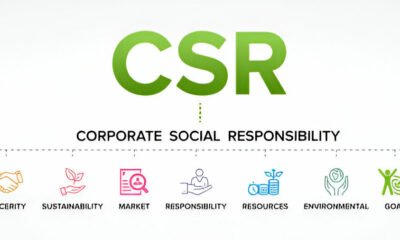

Environment
There is no Planet B: The Growing Importance of ESG
According to leading scientists, the human race has about one decade left to mount a global movement to transition the world economy to a zero-carbon emission system. Whilst the UK Government has pledged to slash emissions by 78% by 2035, it will require a global effort from every nation to if not reverse the human-induced global warming, at least slow it down.
This is where ESG is leading the charge. ESG stands for Environmental, Social and Governance, and refers to three central factors in measuring the sustainability of an investment. This concept has been evolving since the 1990s, when businesses were urged to focus on ‘People, Plant and Profits’ and not just on ‘Profits’.
As a result, ESG is the bedrock of Sustainable and Responsible Investing (SRI).
Environmental
The first element that needs to be taken into consideration with ESG is the environment. This obviously focuses on environmental factors. These include the amount of pollution that is produced, as well as the impact that it has on climate change and the generation of greenhouse gases.
Social
The social aspect is the next part of ESG that needs to be evaluated carefully. This factor looks at all of the ways that humans are impacted by the ESG policies. This includes considerations of customers that have been deceived by disingenuous marketing strategies, employee safety in the workplace and even societal unrest that is caused by the product positioning.
In fact, this aspect is becoming increasingly important for employees too. Employees are now looking to be part of a larger mission and want to work for companies who have a commitment to health and well-being. They want their work to have a purpose.
Governance
Governance criteria examines how a company is governed, (e.g., executive remuneration, tax practises and strategy, corruption and bribery, and board diversity and structure). And with new research suggesting that retailers who can communicate their ethics clearly are more likely to see consumers spend with them.
Sustainability and environmental, social and governance (ESG) programs are key components of long-term value and business resiliency, but it’s not only good ‘business sense’ for businesses to start operating with an ESG program in mind.
An article in the Responsible Investor highlights the growing importance of ESG and quotes:
“ESG is also now accepted as central to legal, corporate and financial risk assessment. A principal reason is that there has been an explosion of related regulation at national, supranational, and international levels. Growth is estimated at over 100 per cent between 2015 and 2018, according to Datamaran.”
ESG programs can help hasten recovery, spur innovation, and reduce risks to additional crises in the future.
In fact, the current pandemic has revealed that many companies have benefited from investing in building social connections and getting the most out of human resources, which enabled them to utilize their human resources to optimal effectiveness, as well as continuing to function in uncertain circumstances.
Also, there are a ton of great reasons to make investing in human resources a priority. Workplace turnover is lower when employees are satisfied. Employees are also more productive and labor costs relative to other operating expenses decrease as well.
It is now becoming clear that companies and financial institutions can no longer ignore the growing importance of ESG; and as a result, law firms have directed more resources to servicing those needs.


 Features11 months ago
Features11 months agoEco-Friendly Cryptocurrencies: Sustainable Investment Choices

 Energy11 months ago
Energy11 months agoThe Growing Role of Solar Panels in Ireland’s Energy Future

 Energy10 months ago
Energy10 months agoGrowth of Solar Power in Dublin: A Sustainable Revolution

 Energy10 months ago
Energy10 months agoRenewable Energy Adoption Can Combat Climate Change




























